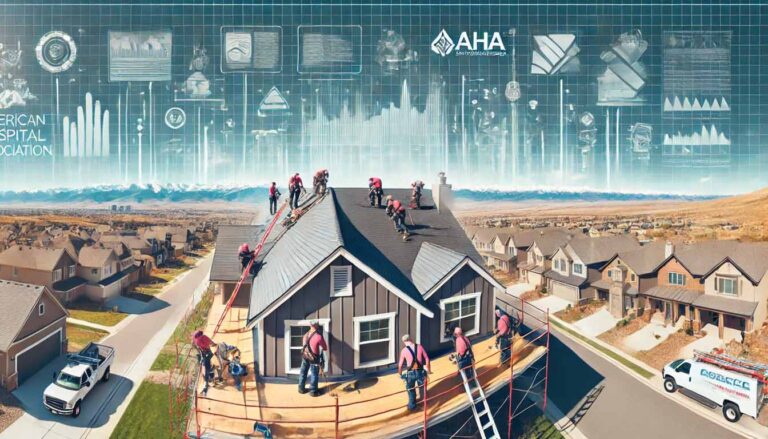Colorado’s diverse and often extreme weather conditions make it essential for homeowners and businesses to ensure their roofs are safe and durable. Adhering to AHA (American Hospital Association) standards for roofing can provide the necessary guidelines for achieving this goal.
Why AHA Standards Matter
Adhering to AHA standards ensures your roof is installed and maintained to the highest safety and quality levels. These standards protect buildings from the harshest elements and provide long-term durability.
Importance of Proper Installation
The Role of Certified Contractors
Proper installation is the foundation of a safe and durable roof. Working with experienced and certified roofing contractors who understand the specific challenges posed by Colorado’s weather is crucial.
Benefits of Using Certified Contractors:
- Knowledge of local building codes
- Expertise in handling various roofing materials
- Ensuring proper installation techniques
“Proper installation is the first step towards a long-lasting roof that can withstand Colorado’s extreme weather conditions.” – John Doe, Denver Roofing Expert
Installation Techniques
The AHA guidelines emphasize the importance of proper installation techniques to prevent leaks, wind damage, and structural failures. Key techniques include:
- Proper Underlayment Installation: Prevents water infiltration.
- Secure Fastening: Ensures shingles and other materials stay in place during high winds.
- Correct Flashing: Prevents leaks around chimneys, vents, and skylights.
Choosing the Right Materials
Recommended Roofing Materials
The choice of roofing materials significantly impacts the safety and longevity of the roof. Materials that can withstand high winds, heavy snow, and hail are ideal for Colorado’s climate.
AHA-Recommended Materials:
- TPO (Thermoplastic Polyolefin): Durable and energy-efficient.
- EPDM (Ethylene Propylene Diene Monomer): Highly resilient synthetic rubber.
- Metal Roofing: Long-lasting and weather-resistant.
Benefits of Durable Materials
Choosing suitable materials can lead to the following:
- Increased Lifespan: Durable materials last longer, reducing the need for frequent repairs.
- Energy Efficiency: Reflective materials can reduce energy costs.
- Reduced Maintenance: High-quality materials require less frequent maintenance.
Regular Maintenance
Essential Maintenance Tasks
Regular maintenance is critical to extending the life of your roof and ensuring its safety. The AHA guidelines recommend periodic inspections and prompt repairs to address minor issues before they become significant problems.
Key Maintenance Tasks:
- Checking for loose or damaged shingles
- Cleaning gutters to prevent water buildup
- Inspecting for signs of wear and tear
Maintenance Schedule:
- Monthly: Visual inspections from the ground.
- Biannually: Comprehensive inspections by a professional.
- After severe weather, immediate checks are needed for storm damage.
Handling Extreme Weather
Preparing for Colorado’s Weather
Colorado is known for its severe weather, including hailstorms, heavy snowfall, and high winds. The AHA provides specific recommendations for reinforcing roofs to withstand these conditions.
Weather Preparation Tips:
- Use Impact-Resistant Materials: Protects against hail damage.
- Ensure Proper Drainage: Prevents water accumulation and potential leaks.
- Reinforce Roof Edges and Flashings: Reduces the risk of wind uplift.
Checklist for Extreme Weather:
- Install storm shutters.
- Reinforce doors and windows.
- Clear debris from gutters and downspouts.
Insurance and Documentation
Navigating Insurance Claims
In roof damage, having thorough documentation and understanding insurance procedures is crucial. The AHA standards suggest maintaining detailed records of all inspections, repairs, and maintenance activities.
Steps for Handling Insurance Claims:
- Document all damage with photos or videos.
- Keep records of all maintenance and repairs.
- File a claim with your insurance company promptly.
- Compare the adjuster’s evaluation with roofing companies’ quotes.
- Negotiate the claim if necessary.
Benefits of Thorough Documentation
Having detailed records can:
- Simplify the Claims Process: Provide clear evidence to the insurance company.
- Ensure Proper Compensation: Accurate documentation can help you get the coverage you deserve.
- Speed Up Repairs: Quicker claim approvals lead to faster repairs.
Safety Measures
Ensuring Safety During Roofing Projects
Safety during roofing projects is paramount. The AHA standards emphasize the importance of safety gear, proper scaffolding, and fall protection measures.
Essential Safety Gear:
- Hard hats
- Safety harnesses
- Non-slip footwear
Safety Protocols:
- Set up scaffolding correctly.
- Use guardrails where necessary.
- Conduct regular safety drills.
Local Reviews
John S., Denver, CO: “Denver Roofing provided exceptional service. They adhered to the highest safety standards, and my new roof looks amazing. I highly recommend them!”
Maria L., Boulder, CO: “The team was professional and thorough. They walked me through the process, from choosing materials to filing my insurance claim. Excellent experience!”
David R., Aurora, CO: “I’ve had bad experiences with other roofers, but Denver Roofing exceeded my expectations. They were knowledgeable and efficient, and my roof has held up great through the winter stor”s.”
Conclusion
Ensuring safe roofing in Colorado involves a combination of proper installation, suitable materials, regular maintenance, and adherence to safety standards. By following AHA guidelines, homeowners and businesses can protect their properties from the harsh Colorado weather and ensure the longevity and safety of their roofs.
For more information on roofing standards and to schedule a professional roof inspection, contact us at Denver Roofing. We are dedicated to providing top-quality roofing services that adhere to the highest safety standards.
